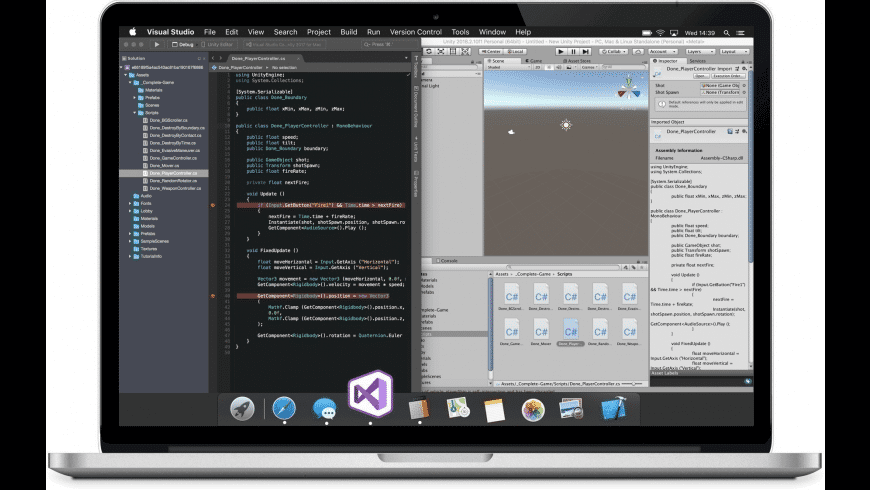- Running Visual Studio On Mac
- The Ultimate Guide To Using Visual Studio On A Mac
- Using Visual Studio On Mac Youtube
- Visual Studio On Mac Vs Windows
Using Visual Studio Code on Mac. Tips n Trix (Pointers to Pointers) Hey all! I found this link super helpful when setting up VS code on my mac. Step 1 - Configure Visual Studio to Support NuGet.org Symbol Sources. For reference, I’m using Visual Studio 2019 with.NET Core 3.0 for most of my day to day work. By default NuGet.org symbol sources aren’t enabled. In order for SourceLink to work properly Visual Studio needs to be able to download these sources, so we have to set this up.
-->To start developing native, cross-platform .NET apps on macOS, install Visual Studio 2019 for Mac following the steps below.
Requirements
- A Mac with macOS High Sierra 10.13 or above.
To build Xamarin apps for iOS or macOS, you'll also need:

- A Mac that is compatible with the latest version of Xcode. See Apple's minimum requirements documentation
- The latest version of Xcode. It may be possible to use an older version of Xcode if your Mac is not compatible with the latest version.
- An Apple ID. If you don't have an Apple ID already you can create a new one at https://appleid.apple.com. It's necessary to have an Apple ID for installing and signing into Xcode.
Installation instructions

Download the installer from the Visual Studio for Mac download page.
Once the download is complete, click the VisualStudioforMacInstaller.dmg to mount the installer, then run it by double-clicking the arrow logo:
You may be presented with a warning about the application being downloaded from the Internet. Click Open.
Wait while the installer checks your system:
An alert will appear asking you to acknowledge the privacy and license terms. Follow the links to read them, then press Continue if you agree:
The list of available workloads is displayed. Select the components you wish to use:
If you do not wish to install all platforms, use the guide below to help you decide which platforms to install:
Type of App Target Selection Notes Apps Using Xamarin Xamarin.Forms Select Android and iOS platforms You will need to install Xcode iOS only Select iOS platform You will need to install Xcode Android only Select Android platform Note that you should also select the relevant dependencies Mac only Select macOS (Cocoa) platform You will need to install Xcode .NET Core applications Select .NET Core platform. ASP.NET Core Web Applications Select .NET Core platform. Azure Functions Select .NET Core platform. Cross-platform Unity Game Development No additional platforms need to be installed beyond Visual Studio for Mac. Refer to the Unity setup guide for more information on installing the Unity extension. After you have made your selections, press the Install button.
The installer will display progress as it downloads and installs Visual Studio for Mac and the selected workloads. You will be prompted to enter your password to grant the privileges necessary for installation.:
Once installed, Visual Studio for Mac will prompt you to personalize your installation by signing in and selecting the key bindings that you'd like to use:
If you have network trouble while installing in a corporate environment, review the installing behind a firewall or proxy instructions.
Learn more about the changes in the release notes.
Note
If you chose not to install a platform or tool during the original installation (by unselecting it in step #6), you must run the installer again if you wish to add the components later.
Install Visual Studio for Mac behind a firewall or proxy server
To install Visual Studio for Mac behind a firewall, certain endpoints must be made accessible in order to allow downloads of the required tools and updates for your software.
Configure your network to allow access to the following locations:
Next steps
Installing Visual Studio for Mac allows you to start writing code for your apps. The following guides are provided to guide you through the next steps of writing and deploying your projects.
iOS
- Device Provisioning(To run your application on device).
Android
Xamarin.Forms
Build native cross-platform applications with Xamarin.Forms:
.NET Core apps, ASP.NET Core web apps, Unity game development
For other Workloads, refer to the Workloads page.
Related Video
See also
-->This tutorial shows how to create and run a .NET console application using Visual Studio for Mac.

Note
Your feedback is highly valued. There are two ways you can provide feedback to the development team on Visual Studio for Mac:
- In Visual Studio for Mac, select Help > Report a Problem from the menu or Report a Problem from the Welcome screen, which will open a window for filing a bug report. You can track your feedback in the Developer Community portal.
- To make a suggestion, select Help > Provide a Suggestion from the menu or Provide a Suggestion from the Welcome screen, which will take you to the Visual Studio for Mac Developer Community webpage.
Prerequisites
Visual Studio for Mac version 8.8 or later. Select the option to install .NET Core. Installing Xamarin is optional for .NET development. For more information, see the following resources:
- Tutorial: Install Visual Studio for Mac.
- Supported macOS versions.
- .NET versions supported by Visual Studio for Mac.
Create the app
Start Visual Studio for Mac.
Select New in the start window.
In the New Project dialog, select App under the Web and Console node. Select the Console Application template, and select Next.
In the Target Framework drop-down of the Configure your new Console Application dialog, select .NET 5.0, and select Next.
Type 'HelloWorld' for the Project Name, and select Create.
The template creates a simple 'Hello World' application. It calls the Console.WriteLine(String) method to display 'Hello World!' in the terminal window.
Running Visual Studio On Mac
The template code defines a class, Program, with a single method, Main, that takes a String array as an argument:

Main is the application entry point, the method that's called automatically by the runtime when it launches the application. Any command-line arguments supplied when the application is launched are available in the args array.
The Ultimate Guide To Using Visual Studio On A Mac
Run the app
Using Visual Studio On Mac Youtube
Press ⌥⌘↵ (option+command+enter) to run the app without debugging.
Close the Terminal window.
Enhance the app
Enhance the application to prompt the user for their name and display it along with the date and time.
In Program.cs, replace the contents of the
Mainmethod, which is the line that callsConsole.WriteLine, with the following code:This code displays a prompt in the console window and waits until the user enters a string followed by the enter key. It stores this string in a variable named
name. It also retrieves the value of the DateTime.Now property, which contains the current local time, and assigns it to a variable nameddate. And it displays these values in the console window. Finally, it displays a prompt in the console window and calls the Console.ReadKey(Boolean) method to wait for user input.NewLine is a platform-independent and language-independent way to represent a line break. Alternatives are
nin C# andvbCrLfin Visual Basic.The dollar sign (
$) in front of a string lets you put expressions such as variable names in curly braces in the string. The expression value is inserted into the string in place of the expression. This syntax is referred to as interpolated strings.Press ⌥⌘↵ (option+command+enter) to run the app.
Respond to the prompt by entering a name and pressing enter.
Close the terminal.
Next steps
Visual Studio On Mac Vs Windows
In this tutorial, you created a .NET console application. In the next tutorial, you debug the app.

